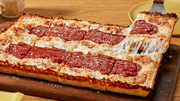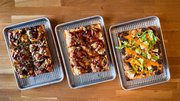Blog
Exploring the role food plays in patient health
The gap between food science and medical science presents a huge healthcare and business development opportunity.
October 24, 2011 by Darrel Suderman — President, Food Technical Consulting
What role could food innovation have in pre-operative or post operative patient care? That's the question I never thought about until I met with the lead surgeon and the director of dietetics at a leading Colorado hospital recently.
This meeting between a leading surgeon, a leading dietician and a food scientist, was spawned by the surgeon's endless quest to improve post-operative patient care. And he was interested in finding ways to improve his patient's operative success rate through providing balanced nutritional products that are scientifically developed for individual surgery case categories. Of course, dieticians have been doing this work for decades, but the work is labor intensive and inconsistent from dietician to dietician. This surgeon wants to develop a line of products that standardizes "food treatment" among case categories. Those categories might include cancer treatment, diabetes, depression, weight loss programs, etc.
His question was "If we can feed our pets prescription diets, then why can't we provide prescription diet products to humans to accelerate their healing processes and increase their likelihood to survive intense medical treatments?" The more I thought about the answer to that question, the more I saw the unlimited roles foods could play to improve patient health. And the solution became personal when I recalled the travails my best friend endured in his recovery from colon cancer. I now understand how gastro intestinal surgery can affect the absorption of food nutrients in one's body.
For years a huge gap has existed between the medical field and the food industry. Fortunately the gap between culinary qualities and medicine has been bridged as hospitals have hired chefs to prepare patient food to improve taste and visual qualities. Hospitals have also invested heavily in hiring dieticians to prepare meals for recovering patients. But the gap between food science and medical science has not been bridged, and remains a huge healthcare and business development opportunity.
Another opportunity exists to incorporate organic, natural and gluten-free foods into mainstream medical care. Because this represents virgin territory, the few suppliers that do fill this niche are able to charge unreasonable prices. I was shocked to hear one clinical dietician describe the $9 charge for a small 8-inch-by-8-inch pan of gluten-free brownies. With more focus on therapeutic foods, we can also help contain the high cost of medical care.
I feel fortunate as an adjunct food science professor at Johnson and Wales University in Denver to be a part of a team that is committed to meeting the needs of the medical industry. The Denver team is committed to assembling culinary chefs, dieticians and food scientists to address these opportunities within the medical field as well as incorporating students into the solution development.
In closing, if anyone thinks the food industry is stagnant in these recessionary times, think again. The culinary, scientific and dietetic horizons are there for the taking. The only thing lacking is the vision to see them.
The Food Innovation Institute now offers food innovation workshops and executive leadership training on food innovation. For more information contact Suderman, president of The Food Innovation Institute at dsuderman@foodbevbiz.com (www.foodbevbiz.com), and Adjunct Professor of Product Development at Johnson & Wales.
 ChatGPT
ChatGPT Grok
Grok Perplexity
Perplexity Claude
Claude








